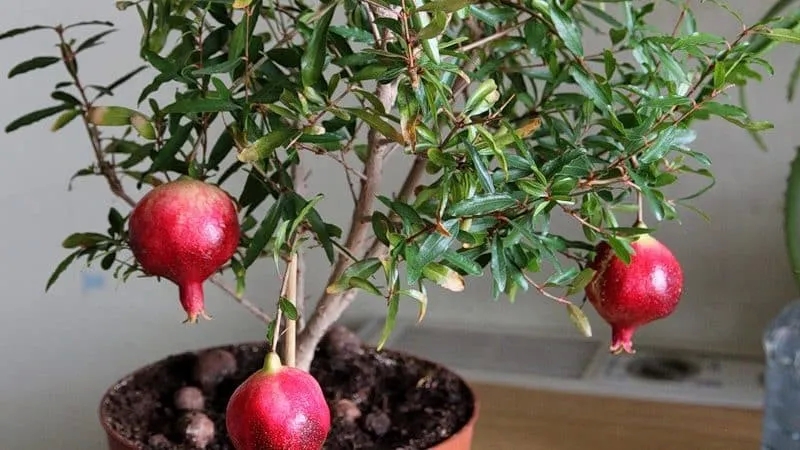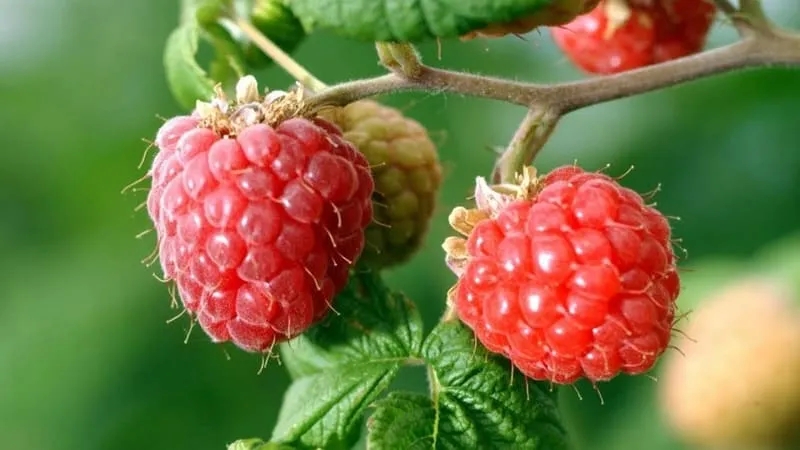Carrots come in orange, red, yellow, and even nearly black. There’s also a white variety. In this article, you’ll learn what white carrots are, their composition, why they lack color, their health benefits, and any potential contraindications.
Table of contents
What Is White Carrot?
White carrots? Their pale color means they lack plant pigments. Is it a mutation? A farming mistake? Can you even eat them? These questions arise for anyone seeing such a root vegetable for the first time.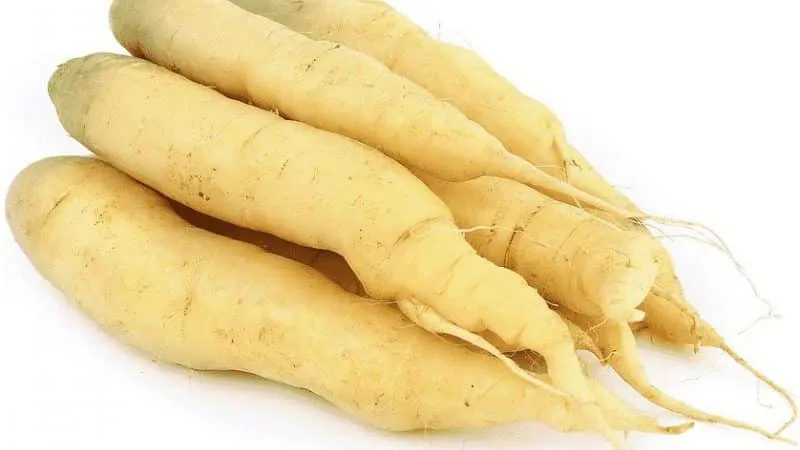
Did you know that carrots weren’t always the color we’re familiar with today? Originally, they were white, bitter, and mostly fit for animal feed. Later, yellow, red, and even purple varieties appeared. It wasn’t until the 17th century that Dutch breeders developed the orange carrot with its familiar sweet taste. The orange variety became the most popular worldwide and remains so today.
Note. Carrots are the only vegetable whose nutritional properties and flavor not only remain intact after cooking but actually improve.
Why Is It White?
White carrots are a distinct cultivated variety with their own characteristics. If you planted orange carrots but grew pale ones, it’s likely due to poor-quality seeds or cultivation errors. Such vegetables tend to be bitter, misshapen, and more grayish than pure white. Essentially, they’ve reverted to a wild state and are best discarded.
True white carrots, however, are a different story. Plant pigments give vegetables their colors—carotene for orange, lutein for yellow, anthocyanin for red, purple, or even black. White carrots simply lack these pigments.
Origin and Development
Modern white carrot varieties were developed by breeders decades ago, based on Eastern yellow carrot strains. The key change was replacing beta-carotene with a compound that produces vitamin E.
The result was a white carrot—technically a distant relative of the wild plant, but unlike its ancestor, it’s not bitter and is rich in vitamins and minerals. This variety thrives in temperate climates, making it well-suited for cultivation across Europe.
How White Carrots Differ from Orange Ones
Aside from color, white carrots look similar to orange ones—though some varieties have parsley-like foliage. They come in cylindrical shapes, growing up to 17 cm long.
Nutritionally, though, the differences are clearer. White carrots have thinner skin, slightly fewer calories, and are a great option for those allergic to pigmented vegetables.
Is It Safe to Eat?
If your white carrots resulted from growing errors rather than being a true variety, it’s best to avoid them. Proper white cultivars, however, are not only edible but excellent for cooking—whether raw, cooked, or preserved.
Flavor Differences
Without pigments that add tartness or sharpness, white carrots taste sweeter and juicier. Their essential oils also give them a pleasant, appetite-stimulating aroma.
Important! The greens can be brewed into a stimulant drink akin to coffee, but consume it cautiously—it may raise heart rate.
Nutritional Profile: Vitamins and Minerals in White Carrots
The key difference between white and colored carrots is the absence of pigments like anthocyanin, beta-carotene, and lutein.
White carrots contain:
- Copper
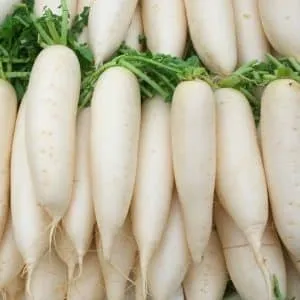
- Iron
- Zinc
- Lithium
- Boron
- Selenium
- Potassium
- Phosphorus
- Chlorine
- Sodium
- Magnesium
- Calcium
- Iodine
- Sulfur
- Chromium
- Fluorine
- Vanadium
- Manganese
- Aluminum
- Nickel
- Cobalt
- Molybdenum
- Pectin
- Bioflavonoids
- Amino acids
They’re also rich in B vitamins, ascorbic acid, vitamins H, K, and E, essential oils, and beneficial dietary fiber.
Caloric and Glycemic Values
White carrots provide 32 kcal per 100 g. Their glycemic index ranges from 34 to 86—lowest when raw, increasing with cooking and storage.
Key Advantages and Disadvantages of White Carrots
True white carrot varieties offer more benefits than drawbacks.
Advantages:
- Low-calorie, ideal for diets
- Rich in nutrients that support health
- Delicate, sweet flavor
- Easy to grow and maintain
- Perfect for people with food allergies
Disadvantages:
- No beta-carotene (and thus no vitamin A)
- Some contraindications apply
Avoid white carrots if you’re allergic to pectin or B vitamins, or have thyroid disorders. Overconsumption (more than 1 kg) may cause diarrhea or strong diuretic effects—though such cases are rare.
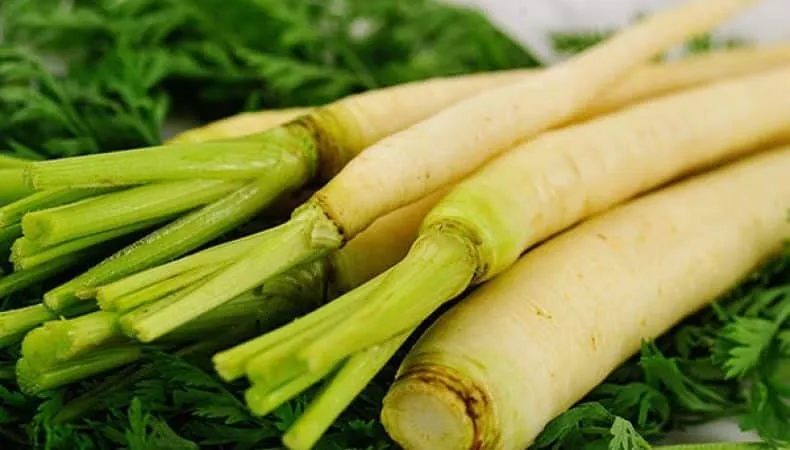
Uses of White Carrots
Like colored carrots, white ones are used in cooking—in salads, soups, casseroles, stews, pies, and as sides for meat or fish. They also feature in traditional medicine and cosmetics.
Decoctions help treat colds, stomach ailments, and liver issues. Mashes make skin-friendly masks that reduce wrinkles, pigmentation, acne, and dryness.
Health Benefits
Packed with nutrients, white carrots offer numerous health perks.
Key Benefits
Their properties are impressively broad:
- May help prevent cancer
- Supports digestive health
- Removes cholesterol and toxins

- Boosts immunity
- Helps regulate blood sugar
- Improves vision
- Enhances metabolism
- Promotes blood clotting
- Reduces risk of strokes, heart attacks, and atherosclerosis
- Acts as a diuretic and choleretic
- Helps heal minor wounds
- Supports nervous system health
- Prevents kidney diseases
- Counters antibiotic side effects
- Has anti-parasitic properties
White Carrot Varieties
Popular European cultivars include:
- White Belgian. Late-maturing (90 days), 20–25 cm long, yellow-white with green near the stem. Requires fertilizers and dislikes cold. Flavor improves when cooked.
- Lunar White. Ready in 60 days. Thin-skinned, sweet, mango-like flesh, up to 30 cm long. Stores well (12 months). Needs consistent watering and temperatures above 16°C. Grows well in colder regions.
- White Satin. A top choice—snow-white, crisp, juicy, cylindrical, up to 30 cm and 100 g. Matures in 70 days. Prefers loose soil and sunlight. Best-flavored white variety.
Unique Applications
White carrots’ standout trait is their suitability for people allergic to plant pigments. They’re also ideal for baby food, as colored veggies aren’t recommended for infants under one year.
Lacking pigments, white carrots are safe where others might stain or irritate—like facial masks for fair skin, which stay clear of orange tints.
Conclusion
Being an "albino" isn’t always a drawback. White carrots prove this—matching or even surpassing their colorful cousins in some ways. If you haven’t tried them yet, now’s the time. Their delicate sweetness might just inspire you to grow them yourself.

